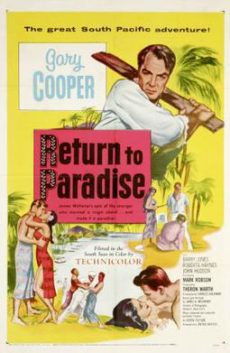
Hollywood On 52nd Street
Return to Paradise is a jazz standard that was written by Dimitri Tiomkin and Ned Washington for the movie of the same name. The film was set and principal photography was shot in Samoa and released by United Artists in 1953. It starred Gary Cooper, Barry Jones and Roberta Haynes and the screenplay by Charles Kaufman was based on the 1951 short story Mr. Morgan by James Michener in his short story collection Return to Paradise, his sequel to Tales of the South Pacific.
The Story
During the 1920s, itinerant American beachcomber Mr. Morgan (Cooper) is deposited on the island of Matareva in the South Pacific. Deciding to stay, he is confronted by Pastor Cobbett (Jones), who lost both his father and his wife as a young missionary on the island and rules the island as a Puritanical despot, using local bullies as wardens to enforce his rules. Morgan wins the support of the natives after defeating the wardens with the aid of an empty shotgun.
Morgan has an illegitimate child with an island girl who dies in childbirth. Leaving his daughter with her grandmother he leaves the island, only to return during World War II. Cobbett has changed, his daughter Turia is now grown and in love with a stranded Navy pilot and Morgan now has to face the inevitable possibility of a repeat of his indiscretion with his daughter. Forcing the split by making the pilot and his crew leave the island, Turia is upset but reconciles with her father who decides to stay on with her on the island.
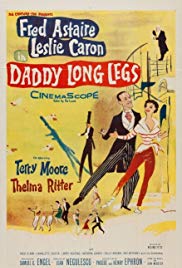
Hollywood On 52nd Street
Something’s Gotta Give was composed by Johnny Mercer for his friend Fred Astaire who starred in the 1955 film Daddy Long Legs. It is the love song duet between him and Leslie Caron. The song playfully uses the irresistible force paradox – which asks what happens when an irresistible force meets an immovable object – as a metaphor for a relationship between a vivacious woman and an older, world-weary man. The man, it is implied, will give in to temptation and kiss the woman.
The film also stars Terry Moore, Thelma Ritter, Fred Clark and Ray Anthony who appears as himself with his orchestra. Filming took place on location at 20th Century Fox Studios in Hollywood and the Andrew Carnegie Mansion in Manhattan.
Storyline
On a trip to France, millionaire Jervis Pendleton III (Astaire) sees an 18 year old girl Julie Andre (Caron) in an orphanage. Immediately enchanted with her, but mindful of the difference in their ages and what the press may report should his involvement be discovered, he anonymously sponsors her to attend fictional college in New England. She writes him letters, which he doesn’t read. After 3 years, he goes to visit her at a dance, not telling her that he is her benefactor. They fall in love, but the usual movie-type difficulties get in the way before they can get together at the end.
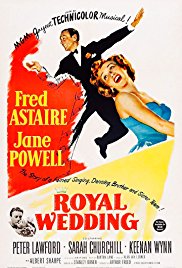
Hollywood On 52nd Street
Too Late Now is a song composed by Burton Lane and the lyrics written by Alan Jay Lerner for the 1951 film Royal Wedding. The song was performed by Jane Powell.
The Story: The film centers around brother and sister dance team Tom and Ellen Bowen whose show closes in New York. Their agent, Irving Klinger (Keenan Wynn), books them in London for the same period as the Royal Wedding. They travel by ship where Ellen (Jane Powell) meets and becomes involved with Lord John Brindale (Peter Lawford). This causes her to miss a rehearsal. Tom (Fred Astaire) uses the time to dance with a hat rack and gym equipment.
Later Tom and Ellen attempt a graceful dance number as the ship rolls to and fro. Upon arrival brother and sister are met by Edgar Klinger (Wynn) who settles them into their hotel. Shortly afterward Tom holds auditions and meets Anne (Sarah Churchill). There is much indecision by the siblings about their romantic partners even though they are in-the-clouds. Ellen sings her third ballad, this time an open declaration of love, to Lawford with Too Late Now. Tom dances on the walls and ceiling of his hotel room. All ends well in this light musical. By the way, there is a vaudeville-style dance number in their show that features slapstick.
Too Late Now is the only song from this film that was to become a jazz standard.
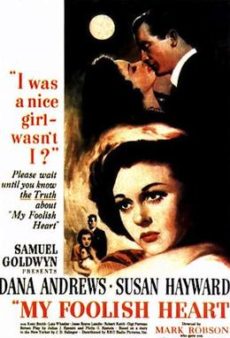
Hollywood On 52nd Street
My Foolish Heart is the theme song to the 1949 film of the same name adapted from J. D. Salinger’s 1948 short story Uncle Wiggily in Connecticut. Directed by Mark Robson and starred Dana Andrews and Susan Hayward. The film tells the story of a woman’s reflections on the bad turns her life has taken.
Unfortunately for movie fans this remains the only authorized film adaptation of Salinger’s work as the filmmakers’ infidelity to his story famously precluded any possibility of film versions of other Salinger works, including The Catcher in the Rye. Though a lackluster and critical reception met the movie, Hayward was nominated for an Academy Awards for Best Actress in a Leading Role and Victor Young and Ned Washington for Best Music, Song for the title song and which has become a jazz standard.
The film was recognized with a nomination by American Film Institute in 2002 to AFI’s 100 Years…100 Passions, however, it did not make the list.
Sponsored By
www.whatissuitetabu.com
![]()
#preserving genius
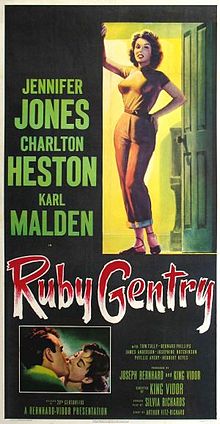
Hollywood On 52nd Street
The song Ruby was composed by Heinz Eric Roemheld as the theme for the 1952 film Ruby Gentry. It subsequently became a jazz and pop standard, both as an instrumental and with lyrics by Mitchell Parish. The film was directed by King Vidor and starred Jennifer Jones as Ruby Corey/Gentry, Charlton Heston played Boake Tackman and Karl Malden held down the role of Jim Gentry. At the time of the film’s release the theme enjoyed much popularity in an orchestration by Les Baxter with harmonica solo by Danny Welton.
The Story: Ruby, a poor backwoods girl living in the small North Carolina town of Braddock, is still in love with Boake Tackman. During high school, Ruby had rebuffed his aggressive advances, and was taken in for a couple of years by kind wealthy businessman and his wife, who protected her and taught her the skills a lady would need. She moves back home when her father needed her help. Boake’s family used to be wealthy, but after generations of profligacy all he has left is the land he has had drained and farmed. He starts a relationship with her but plans to marry a local woman with a rich family. When Ruby hears the news, she marries her former benefactor, Mr. Jim Gentry, whose invalid wife recently died, despite not loving him.
Her background keeps her from being accepted by most of Jim’s peers, most of whom decline to attend their after-wedding party. Insecure, Jim becomes jealous of her relationship with Boake, has a fight, calls her a tramp and she leaves in tears. Apologies ensue and while sailing she admits her lack of loving him, while a loose rope results in Jim being knocked overboard by the boom, leaving Ruby widowed and distraught. Now she becomes the local gold-digger and murderess, the town rebuffs her and she gets harassing phone calls.
Retaliating, Ruby uses Jim’s money to begin a campaign against everyone who slighted her, calling in debts to close down people’s businesses as well as the newspaper that slandered her. Still holding a soft spot for Boake she returns his promissory note but again he rebuffs her kindness as a way to buy him and her out of the swamp. Once again, woman scorned and she floods Boake land, ruins his crop and once calm, apologizes. However, her estranged brother Jewel begins shooting at them, killing Boake and in turn Ruby kills her brother and then laments her decisions that have caused so much pain. Now alone, Ruby becomes the skipper of a fishing boat, forever looked down upon by the townspeople.
Sponsored By
www.whatissuitetabu.com
![]()
#preserving genius



